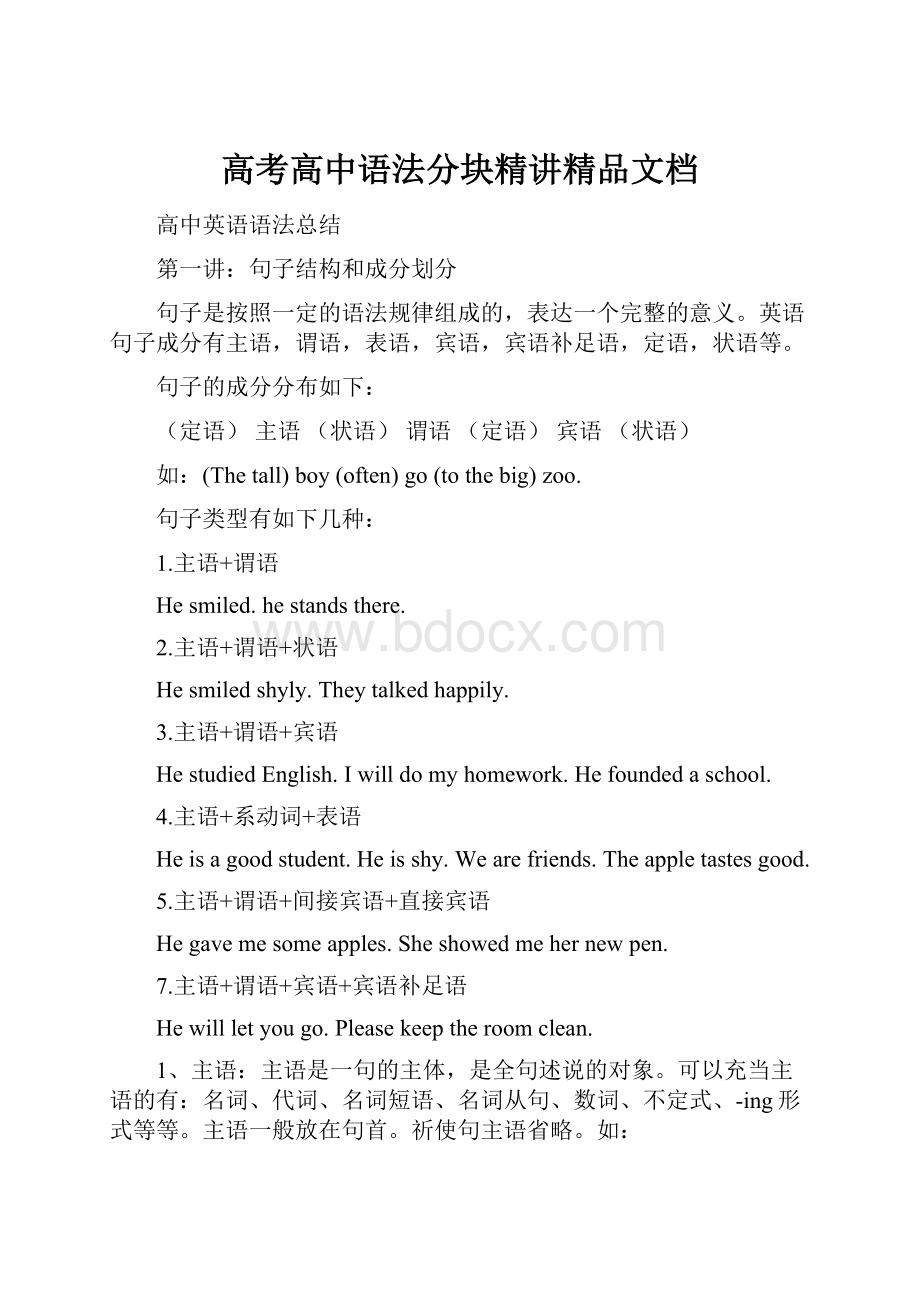高考高中语法分块精讲精品文档.docx
《高考高中语法分块精讲精品文档.docx》由会员分享,可在线阅读,更多相关《高考高中语法分块精讲精品文档.docx(79页珍藏版)》请在冰豆网上搜索。

高考高中语法分块精讲精品文档
高中英语语法总结
第一讲:
句子结构和成分划分
句子是按照一定的语法规律组成的,表达一个完整的意义。
英语句子成分有主语,谓语,表语,宾语,宾语补足语,定语,状语等。
句子的成分分布如下:
(定语)主语(状语)谓语(定语)宾语(状语)
如:
(Thetall)boy(often)go(tothebig)zoo.
句子类型有如下几种:
1.主语+谓语
Hesmiled.hestandsthere.
2.主语+谓语+状语
Hesmiledshyly.Theytalkedhappily.
3.主语+谓语+宾语
HestudiedEnglish.Iwilldomyhomework.Hefoundedaschool.
4.主语+系动词+表语
Heisagoodstudent.Heisshy.Wearefriends.Theappletastesgood.
5.主语+谓语+间接宾语+直接宾语
Hegavemesomeapples.Sheshowedmehernewpen.
7.主语+谓语+宾语+宾语补足语
Hewillletyougo.Pleasekeeptheroomclean.
1、主语:
主语是一句的主体,是全句述说的对象。
可以充当主语的有:
名词、代词、名词短语、名词从句、数词、不定式、-ing形式等等。
主语一般放在句首。
祈使句主语省略。
如:
Studentsstudy.Wearefriends.HelikeswatchingTV.Pleasebehappy!
2、谓语:
谓语是对主语加以陈述,表示主语的行为或状态,常用动词或者动词词组担任(分为be动词,及物动词,不及物动词几类;情态动词、助动词、不定式、-ing等不能做谓语),放在主语的后面。
可以有不同的时态,语态和语气。
Studentsstudy.Wearefriends.IcanspeakalittleEnglish.
注:
除情态动词和助动词须加其他动词一起充当谓语、或者有连词连接的情况下,一个句子中忌两个动词。
3、表语:
表语是谓语的一部分,它位于系动词如be之后,说明主语身份,特征,属性或状态。
一般由名词,代词,形容词,副词,不定式,介词短语等充当。
Mysisterisanurse.Thistableislong.Sheisbeautiful.
4、宾语:
(1)宾语表示动作行为的对象,跟在及物动词或者介词之后。
充当宾语形式:
名词、代词、名词短语、名词从句、数词、不定式、-ing形式等。
WelikeEnglish.HeplaysPing-Pongeveryday.Sheeatsicecream.
(2)有些及物动词可以带两个宾语,往往一个指人,一个指物,指人的叫间接宾语,指物的叫直接宾语。
这类动词有give,show,bring,read,pass,lend,tell,leave,teach,write,buy,sing等。
Hegavemesomeink.Iwillbringyousomewater.Shelendsmeabook.
(3)一些动词后面常跟复合宾语,这类动词有let,see,watch,hear,help,feel,keep,call,make,find,tell,ask,think,want等。
例如:
Wemustkeeptheclassroomclean.Hedidn’tletmego.Theycallthebird“Polly”.
注:
在疑问句中,如果宾语是疑问词,则宾语要放在句首。
如:
Whatdidhesee?
Whatdoeshewritealetterwith?
5、定语在句中修饰名词或代词的成分叫定语。
用作定语的主要是形容词,也有一些作形容词用的代词,数词,名词,副词,动词不定式,介词短语等,还有定语从句。
形容词放在名词之前。
Heisanewstudent.Thisisaredsun.
副词,动词不定式,介词短语、现在分词短语、定语从句等作定语时,则放在被修饰的词之后。
Thebikeintheroomismine.Thegirlsofmyclassareverybeautiful.
6.状语状语是用来对动词,形容词,副词或整个句子进行说明。
常由副词、状语从句担任。
位置比较灵活。
一般有表示时间,地点,肯定,否定,程度,频度,方式,伴随,原因,目的,比较等状语。
Icomeheretoseeyou.HelivesinLondon.Iwillvisityouwhenyouarenotbusy.
练习:
请分析下面句子的结构说出各个成分
1)Ihavetwoeldersisters.
2)Theydon'tswimverywell.
3)Doyougotoschooleveryday?
4)Ireallywantacupoftea.
5)MissSmithteachesEnglishverywell.
谓语专讲:
以下是几种常见而复杂的谓语结构:
①情态动词+原形动词。
如:
You’dbettergooverthelesson.
②shall/will/would+原形动词。
如:
Theyshouldhavebeenthereonce.
③be+现在分词或者过去分词。
如:
Whatareyoudoingthisevening?
Manytreeshavebeencutdownsince1970s.
④have+过去分词。
如:
Manytreeshavebeencutdownsince1970s.
⑤一般时问句和否定句中:
do/does/did+原形动词。
如:
Hedoesnotenjoyhimselfverymuch./Didanyofyouseedinosaureggs?
不可用形容词、名词、代词、副词、介词短语等独立作谓语,必须在此之前加连系动词。
记住:
主语、谓语单复数必须保持一致。
第二讲:
名词性从句划分以及主语从句
由一个主句和一个或一个以上的从句构成的句子叫复合句。
在复合句中主句是全句的主体,从句是全句的一个成分,不能独立。
从句通常是用关联词来引导的。
在复合句中充当主语的从句叫做主语从句。
主语从句的引导词有:
连词that,whether,if,这三个词在从句中不充当任何成分;连接代词who,whom,whose,whoever,what,which;连接副词when,where,how,why。
主语从句:
常规主语从句:
即在复合句中充当主语的从句
Thathefinishedwritingthecompositioninsuchashorttimesurprisedusall.
Whetherwewillgoforanoutingtomorrowremainsunknown.
Whowillbeourmonitorhasn'tbeendecidedyet.
Whomwemuststudyforisaquestionofgreatimportance.
Whatcausedtheaccidentremainsunknown.Whateveryoudidisright.
Whatweneedistime.Whoeverpassestheexamcanget50yuan.
注:
主语从句的时态:
不受主句的时态影响和限制。
主语从句的连接词不能省略;单个主语从句充当主语时,一般视为单数,但也有例外,如第九例。
Whether用法比if广。
特殊的主语从句:
由that引导的从句,通常用形式主语来代替。
即为了防止句子头重脚轻,通常把形式主语it放在主语位置,真正主语置于句末。
Itis+形容词/名词/某些动词ed/某些不及物动词+that引导的从句。
(1)Itiscertainthathewillwinthematch.
(2)Itistruethathehasmadeaveryimportantdiscoveryinchemistry.
(3)Itisverylikelythattheywillholdameeting.
(4)Itisstrangethatheshoulddothat.
(5)Itisimportantthatweallshouldattendthemeeting.
(6)Itisapitythatwewon'tbeabletogotothesouthtospendoursummervacation.
(7)Itisstillamysterywhatcausedtheaccident.
(8)Itissuggestedthattheworkshouldbedonewithgreatcare.(虚拟语气)
(9)Itissaidthathehasgonetoshanghai.(=Heissaidtohavegonetoshanghai)
(10)ItisknowntoallthatthegunpowderwasfirstinventedbytheChinese.
(11)Itseems/appearsthathehasseenthefilm.=Heseemstohaveseenthefilm.
小结:
(1)That引导的主语从句若没有放在句首,that可以省略。
(2)在有些that从句中要用虚拟语气(should+do/should+havedone)。
(3)What引导主语从句时在从句中充当句子成分,如主语.宾语.表语;that在从句中不作成分。
强调句型:
常考的强调句结构也是it引导的句子。
it引导的强调句是对句子某一部分进行强调,无论强调的是什么成分,都用连词that(被强调部分指人时也可用who/whom)来引导从句。
句子形式为:
Itis(was)+被强调部分+that/who/whom+句子其他部分。
此结构只能用来强调主语,宾语和状语。
原句:
Myfatherdidtheexperimentinthelabyesterdayevening.
强调主语:
Itwasmyfatherwhodidtheexperimentinthelabyesterdayevening.
强调宾语:
Itwastheexperimentthatmyfatherdidinthelabyesterdayevening.
强调时间状语:
Itwasyesterdayeveningthatmyfatherdidtheexperimentinthelab.(注意不用when)
强调地点状语:
Itwasinthelabthatmyfatherdidtheexperimentyesterdayevening.
更多例子:
Itisfromthesunthatwegetlightandheat.=Fromthesun,wegetlightandheat.
ItwasnotuntilIhadreadyourletterthatIunderstoodthetruestateofaffairs.=IdidnotunderstandthetruestateofaffairsuntilIhadyourletter.
注:
区分it作形式主语指代主语从句与it引导强调句型的有效技巧是:
将“Itbe...that...”中的itbe和that去掉,去掉后句子仍然成立的是强调句,句子不能成立的是that引导的主语从句。
例如:
Itwasmysuggestionthatmadehimconfident.
去掉itbe和that后可以构成完整句子:
Mysuggestionmadehimconfident,因此本句是强调句。
Itismysuggestionthatheneedsmorepractice.本句中,itis和that去掉后,句子不成立,所以本句是主语从句。
强调谓语:
用“助动词do/did/does+动词原形”来强调谓语动词。
谓语动词只有两种时态能强调,即一般现在时和一般过去时。
例如:
Docomein.Iworkhard.→Idoworkhard.Shelovesyou.→Shedoesloveyou.
Myfathersmokesalot.→Myfatherdoessmokealot.Ididcallyouinthemorning.
练习:
1._____weneedmorepracticeisquiteclear.
A.WhenB.WhatC.ThatD./
2._____Iacceptthegiftorrefuseitisnoneofyourbusiness.
A.IfB.WhetherC.EvenifD.Nomatterwhen
3._____knowsthetruthaboutitwilltellyou.
A.WhothatB.ThatC.WhoeverD.Thatwho
4._____heisdoingseemsquitedifficult.
A.HowB.ThatC.WhichD.What
5._____certainthathisinventionwillleadtothedevelopmentofproduction.
A.That’sB.ThisisC.It’sD.What’s
6._____thatthereisanothergoodharvestthisyear.
A.ItsaysB.ItissaidC.ItwassaidD.Hewassaid
7._____thatshehasreceivedadoctor’sdegree.
A.It’sasplendidnewsB.ThisisasplendidnewsC.It’ssplendidnewsD.Thisissplendidnews
8.Itisstrange_____.
A.thatnooneshouldlikethisbookB.thatnoonelikedthisbook
C.thatwhynoonelikesthisbookD.whynoonelikesthisbook
9.Itissuggestedthattheexperiment_____underlowtemperature.
A.makesB.ismakeC.shouldbemadeD.willbemade
10._____stillneedstobediscussed.
A.HowistheplantobecarriedoutB.Howtheplanistobecarriedout
C.WhyistheplancarriedoutD.Whytheplancarriedout
11._____isunknowntousall.
A.WheredidsheputitB.WheresheputitC.ThatwheresheputitD.Inwhichsheputit
12._____nothingtodowithus.
A.WhathedidisB.WhathehasdoneisC.WhatdidhedohasD.Whathehasdonehas
13.Itwasnotuntillateintheevening_____herhusbandarrivedhome.
A.whichB.whenC.thatD.how
15.Itwasnot_____shetookoffherdarkglasses_____Irealizedshewasafamousfilmstar.
A.when;thatB.until;thatC.until;whenD.when;then
1.---Wereallthreepeopleinthecarinjuredintheaccident?
--No,___onlythetwopassengerswhogothurt.
A.itwasB.thereisC.itwereD.therewas
2.---Whoismakingsomuchnoiseinthegarden?
--___thechildren.
A.ItisB.TheyareC.ThatisD.Thereare
3.Itwas___shewasabouttogoout____thetelephonerang.
A.when;thatB.so;thatC.before;thenD.when;before
4.Itwas___hesaid___disappointedme.
A.what;thatB.that;whatC.that;whenD.it;when
5.____thatsilverisnotwidelyusedasaconductor?
A.WhyisB.IsitwhyC.WhyisitD.Whyisthat
6.--Ican’tfindMr.Smith.Wheredidyoumeethimthismorning?
--Itwasinthehotel___hestated.
A.thatBwhichC.theoneD.where
7.Itwasinthesmallhouse___wasbuiltwithstonesbyhisfather___hespenthischildhood.
A.which;thatB,that;whereC,which;whichD.that;which
8.Itwas___itwasrainingsohardthatwehadtostayathomeallday.A.sinceB.forC.asD.because
17.Itistheabilitytodothejob____matters,notwhereyoucomefromorwhatyouare.
A.oneB.thatC.whatD.it
18.Idon’tknow____thatyoustayhere.
A.howlongitisB.howlongisitC.itishowlongD.isithowlong
19.Itwas_____thatcausedhimtoservedinneranhourlaterthanusual.
A.webeinglateB.ourbeinglateC.weweretoolateD.becausewewerelate
20.--Whatwasthepartylike?
--Wonderful.It’syears_____Ienjoyedmyselfmuch.
A.afterB.beforeC.thatD.since
第三讲:
直接引语变间接引语
引述别人的话有两种方式:
一是使用引号引出人家的原话,这叫做直接引语;一是用自己的话把人家的话转述出来,这叫做间接引语。
例如:
Johnsaid,"I’mgoingtoLondonwithmyfather."(引号内是直接引语)
JohnsaidthathewasgoingtoLondonwithhisfather.(宾语从句是间接引语)
一、如何变人称;
下面有一句顺口溜“一随主。
二随宾,第三人称不更新”。
“一随主”是指在直接引语变间接引语时,如果从句中的主语是第一人称或被第一人称所修饰。
从句中的人称要按照主句中主语的人称变化如:
Shesaid."Mybrotherwantstogowithme."→Shesaidherbrotherwantedtogowithher..
“二随宾”是指直接引语变间接引语时,若从句中的主语及宾语是第二人称。
或被第二人你所修饰。
从句中的人称要跟引号外的主句的宾语一致。
如果引号外的主句没有宾语。
也可以用第一人称,如:
HesaidtoKate."Howisyoursisternow?
"→HeaskedKatehowhersisterwasthen
“第三人称不更新”是指直接引语变间接引语时。
如果从句中的主语及宾语是第三人称或被第三人称所修饰从句中的人称一般不需要变化如:
MrSmithsaid。
"Jackisagoodworker。
"→MrSmithsaidJackwasagoodworker。
Hesaid,"YouareyoungerthanI."-’Hesaid(that)Iwasyoungerthanhim.
二、如何变时态:
直接引语在改为间接引语时、时态需要做相应的调整。
现在时它需改为过去时态;过去时态改为完成时;过去完成时则保留原来的时态。
如:
1)Shesaid."Ihavelosta